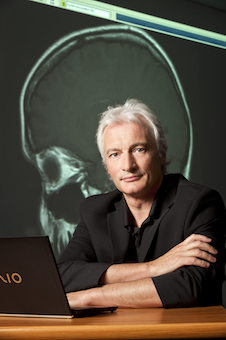 Thursday 30 May 2019 4:24pm
Thursday 30 May 2019 4:24pm
Dean's Medal winner, Professor Dirk De Ridder.
Neurosurgeon Professor Dirk De Ridder has been awarded the prestigious Dean's Medal at the annual Health Research Excellence Awards, for his work on neuromodulation to treat brain conditions ranging from addiction to Parkinson's Disease.
Awarded for significant and long-standing achievement in research, the medal was one of more than 30 awards announced at a function acknowledging the unique partnership between the University of Otago's Dunedin School of Medicine and the Southern District Health Board, which attracted staff from both organisations.
Dean of the Dunedin School of Medicine Professor Barry Taylor says Professor De Ridder, who holds the Neurological Foundation Chair in Neurosurgery, is a leader in neuromodulation which applies electric and magnetic stimuli to modify brain function.
"Dirk has made a major contribution to neuroscience in Dunedin and indeed across the world, and that is what we are acknowledging in this award," he says.
"His research opens the way to understanding how you might change brain function to deal with some of the chronic problems we are facing in the country at the moment."
Professor De Ridder says as a neurosurgeon the research he does has to have practical applications.
"It has to be able to be translated to the clinic where it can be used to help people who have brain-related disorders," he says.
"We are trying to treat a lot of different pathologies. Our approach tries to look at what is common between them and then use that common mechanism in the brain to try and treat multiple different brain disorders."
Other awards presented at the function ranged from new researcher start up awards to the Research Development Investment Award, worth $200,000 over two years, which has gone to Dr Michael Tatley, Director of the New Zealand Pharmacovigilance Centre (NZPhvC), University of Otago.
The funding will be used to create the Medicine Vigilance Safety Hub, which will look to use significant volumes of data already available from the National Poisons Centre and other clinical and research collaborations, to generate research findings and questions of interest both nationally and internationally.
Meanwhile, the Health Service Delivery Grant, of up to $100,000 per year, has gone to a group led by Dr Carol Atmore.
This is a research project from Alliance South (Southern District Health Board and WellSouth Primary Health Network) and the Centre for Health Systems and Technology (CHeST) to evaluate the implementation of Southern Primary and Community Care Strategy (PCCS) and build evaluation capacity within the Southern Health System.
Successful implementation of the PCCS is critical to the future viability of the Southern Health System, including the success of the new Dunedin Hospital when it is built.
The Health Research Excellence Awards were held on Wednesday 29 May from 5:30pm-7:30pm at the Dunedin Public Art Gallery.
For further information, contact
Professor Barry Taylor
Dunedin School of Medicine
Email barry.taylor@otago.ac.nz
Award recipients
Health Research Excellence Awards
Dean's Medal for Research Excellence
Professor Dirk De Ridder
Research Development Investment Award
Dr Michael Tatley
Health Service Delivery Grant
Dr Carol Atmore and team
Best Collaboration
Lisa Kremer, Associate Professor David Reith, Associate Professor Roland Broadbent, Dr Liza Edmonds, Associate Professor Natalie Medlicott, Frances McCaffrey and Dr Mary-Jane Sime for Randomised controlled trial: Microdrop administration of phenylephrine and cyclopentole in neonates.
Best Published Paper by a Masters' or PhD Student
Sarada Ketharnathan: A non-coding genetic variant maximally associated with serum urate levels is functionally linked to HNF4A - dependent PDZK1 expression
Published in Human Molecular Genetics.
Research Publication Awards
Dr Andrew Reynolds: Carbohydrate quality and human health: a series of systematic reviews and meta-analyses
Published in The Lancet.
Professor Robert Walker: Podocyte GSK3 is an evolutionarily conserved critical regulator of kidney function
Published in Nature Communications.
Dr Charlene Rapsey: Childhood sexual abuse, poly-victimization and internalizing disorders across adulthood and older age: findings from a 2 year longitudinal study
Published in The Journal of Affective Disorders.
Research Support Person Award
Janelle Tangney: NIPIRA study (Non-iterative Pseudo Inverse Based Recovery Algorithm) explores neonatal skin injuries and epidemiologic factors at three neonatal units in Australia and New Zealand.
Dunedin School of Medicine Prizes and Scholarships
Gil Barbezat Summer Studentship Award
Vaughn Ticar, Project: Evading the immune system by the human papillomavirus cancer-causing proteins in cell derived particles.
Clinical Research Scholarship
Dr Carol Atmore
Ibtihalat Mohamed
Emily Johnston Scholarship
Gianna Salis
Lauren Weaver
Frances G Cotter Scholarship
Ibtihalat Mohamed
Dunbar Scholarship
Shelley Mitchell
Lady King Scholarship
Annika Sjoeholm
Dunedin School of Medicine Departmental Awards
The Jan Breward Award for Research Excellence in General Practice
Dr Sharon Leitch (General Practice and Rural Health)
Excellence in Research Support
Professor John McMillan (Bioethics Centre)
Susan Bell (Preventive and Social Medicine)
Jacqueline Ludgate (Pathology)
Ali Cameron (Office of the Dean)
Rachel Sayers (Women's and Children's Health)
Early Career Research Award
Dr Sarah Donald (Preventive and Social Medicine)
Departmental Support Person
Willemijn De Bruin (Medicine)
New Researcher Start up Awards
Dr Sean Coffey
Dr Sharon Pattison
Dr Megan Anakin
Dr Adele Woolley
Dr Helen Harcombe
Dr Susan Jack
Associate Professor Sue Crengle
FIND an Otago Expert
Use our Media Expertise Database to find an Otago researcher for media comment.